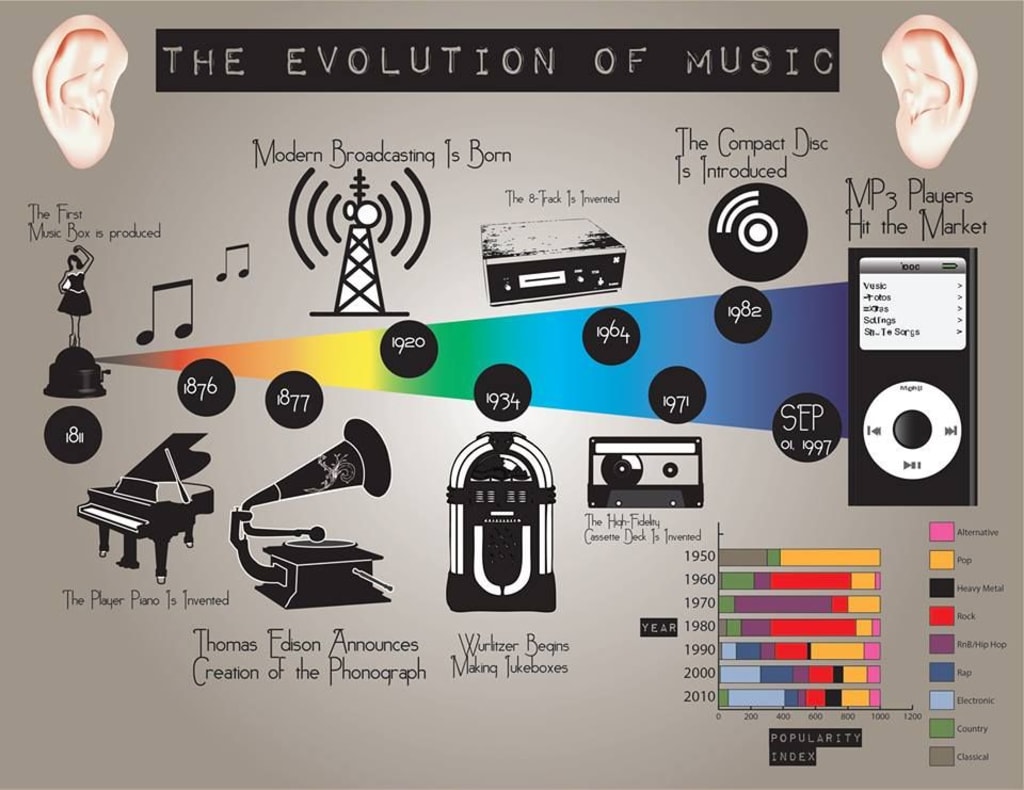
Music is a form of art that has been a part of human civilization for thousands of years. From the early sounds of nature to the intricate melodies of today's pop music, music has evolved in countless ways throughout history. The history and evolution of music can be traced back to its earliest roots and can be broken down into several distinct eras.
Ancient Music
The earliest known form of music can be traced back to ancient civilizations such as those of Egypt, Greece, and Rome. Ancient music was often associated with religious ceremonies and was used to communicate with the gods. These early forms of music were typically composed of simple melodies and rhythms and were performed on basic instruments such as flutes and drums.
Classical Music
The period of classical music is generally considered to have begun in the mid-18th century and lasted until the early 19th century. This era was characterized by a focus on complex melodies and harmonies, as well as the use of symphonies and operas. The music of this period was typically composed by famous composers such as Wolfgang Amadeus Mozart, Ludwig van Beethoven, and Johann Sebastian Bach.
Romantic Music
The romantic period of music began in the early 19th century and lasted until the early 20th century. This era was characterized by a focus on emotion and individual expression in music. Composers of this period, such as Frederic Chopin and Franz Schubert, often used complex harmonies and unconventional forms to create deeply emotional and expressive pieces.
Jazz Music
The history of jazz music can be traced back to the late 19th century in New Orleans. Jazz is a genre that is characterized by improvisation and syncopated rhythms. Jazz music quickly became popular throughout the United States and eventually spread to other parts of the world. Famous jazz musicians of the early 20th century include Louis Armstrong, Duke Ellington, and Billie Holiday.
Rock and Roll Music
Rock and roll music emerged in the United States in the 1950s and quickly became a global phenomenon. The genre is characterized by a driving beat and electric guitars, and is often associated with rebellion and youth culture. Famous rock and roll musicians of the 1950s and 1960s include Elvis Presley, The Beatles, and The Rolling Stones.
Pop Music
Pop music is a genre that emerged in the mid-20th century and is characterized by its catchy melodies and simple lyrics. Pop music is typically associated with popular culture and is often used in advertising and marketing campaigns. Famous pop musicians of the 20th and 21st centuries include Michael Jackson, Madonna, and Beyonce.
Electronic Music
Electronic music emerged in the mid-20th century with the development of electronic instruments such as synthesizers and drum machines. Electronic music is characterized by its use of electronic sounds and often features repetitive beats and rhythms. The genre has continued to evolve and diversify over the years, with sub-genres such as techno, house, and dubstep gaining popularity.
Hip Hop Music
Hip hop music emerged in the 1970s in the Bronx, New York City, and quickly spread throughout the United States and eventually the world. Hip hop is characterized by its use of rapping, DJing, and sampling. The genre is often associated with urban culture and is often used as a form of social commentary. Famous hip hop musicians of the past few decades include Tupac Shakur, Jay-Z, and Kendrick Lamar.
In conclusion, the history and evolution of music is a long and complex story that has unfolded over thousands of years. From the earliest forms of ancient music to the latest trends in electronic and hip hop music, music has evolved in countless ways and has played an important role in shaping human culture and society. Each era of music has its own unique characteristics and contributions to the musical landscape, with composers and performers using different techniques, styles, and instruments to create works of art that are reflective of their times and cultures.
Music has not only evolved in terms of its sound and style but also in terms of its role in society. Throughout history, music has been used for a variety of purposes such as entertainment, religious ceremonies, political statements, and social movements. Music has also played a significant role in shaping popular culture and has been instrumental in the development of film, television, and advertising.
One of the most significant developments in the history and evolution of music has been the advancements in technology. From the invention of the printing press in the 15th century, which made it possible to disseminate musical scores more widely, to the advent of digital music in the 21st century, technology has transformed the way we create, consume, and distribute music.
In recent years, there has been a growing trend towards the fusion of different musical styles and genres, resulting in new and innovative forms of music. Musicians are increasingly experimenting with new sounds and instruments, and collaborating with artists from diverse backgrounds to create music that is reflective of the changing times and cultures.
In conclusion, the history and evolution of music is a rich and complex tapestry that spans thousands of years and encompasses a wide variety of styles, genres, and traditions. From the earliest forms of ancient music to the latest trends in electronic and hip hop music, music has played an important role in shaping human culture and society. As technology and society continue to evolve, so too will music, and we can only imagine what new forms and styles of music will emerge in the years and decades to come.
About the Creator
Jeno Trashan
Story writer Jeno Trashan creates captivating tales filled with adventure, emotion, and imagination. A true lover of words, Jeno weaves unforgettable stories that transport readers to far-off lands.






Comments
There are no comments for this story
Be the first to respond and start the conversation.